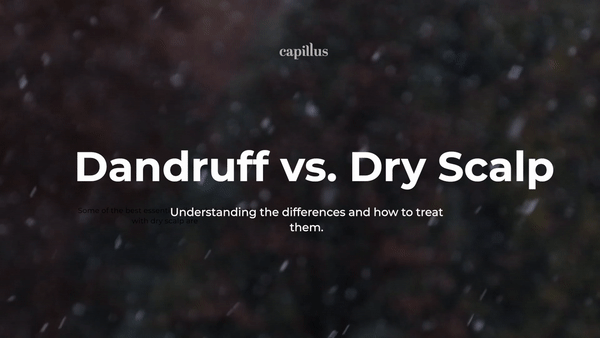
- by Robert Barroso
Dandruff vs. Dry Scalp: Understanding the Differences.
- by Robert Barroso
Dandruff is when your scalp sheds more epidermal cells than usual. You can typically see dandruff when you aren’t shampooing enough, have oily skin, or caused by a fungus.
Dandruff appears as large, oily flakes of dead skin that usually clump up and can be visible by looking in a mirror (or by running your hand through your hair and seeing the dandruff flake off your hair).
Dry scalp on the other hand may look similar, but it’s a lot smaller…and drier. If you scalp doesn’t have enough moisture, due to factors like age, hair care products, and climate.
Simply, dry scalp is when the skin on your scalp gets too dry and flakes off. Dandruff is primarily caused by your scalp having too much oil.
In the case of dandruff, it can also be caused by Malassezia.
Malassezia is a fungus that makes its home in our hair.
There are different species of Malassezia, and the kind you get is dependent on your location and climate. Fortunately for about half our population, this fungus is completely harmless. However, for the other half, they are more vulnerable to what Malassezia can do to their scalp.
Malassezia feeds off the oils on your scalp, called sebum. The byproduct of Malassezia feeding on the sebum is oleic acid. Some people are more receptive to this oil and can induce dandruff-like symptoms.
As explained above, dandruff is the build-up of oil and dry skin that form large flakes. Rubbing your hair may cause the dandruff to flake off, but the act of physically rubbing your hands through your hair will not cause dandruff.
There hasn’t been any link for either dandruff or a dry scalp to directly cause hair loss. However, they may cause irritations and scratchy-ness that may cause you to aggressively rub your hair – forcefully ripping it from your scalp. This form of hair loss is called “traction alopecia.”
Dyeing your hair is an easy – yet impactful way to express yourself. However, some chemicals that are used to dye your hair can be harmful for your scalp. Depending on the chemicals used, the dye can even lead to permanent damage to your scalp causing some forms of hair loss if not careful. We recommend reading the ingredients and making sure the chemicals listed aren’t harmful.
More premium hair dyes tend to not have these harmful chemicals. However, even if the ingredients don’t cause hair loss, some can still lead to dandruff or dry scalp. Note that the hair dyes themselves don’t cause dandruff or dry scalp, but instead can set the stage for bacteria or fungal infections to grow – which have been shown to promote both dandruff and dry scalp. Some of these chemicals can negatively interact with the natural oils in your hair, drying them out in the process.
Dandruff comes from hair, so the lack of hair means that you won’t get dandruff! That won’t save you from not having a dry scalp, however. It’s common for the bald to have dry scalp, since there’s no hair to help lock in moisture and oils. So, if you do scratch your bald head and see flakes, it’s not dandruff – but dry skin that has flaked off.
Yes! Both dogs and cats can get dandruff. Either due to disease, grooming habits, or a nutrient deficit – it can be very uncomfortable for your pet if left untreated. If you have any suspicion that your pet has dandruff, visiting a vet is a good way to be sure. From there, they may recommend some shampoos or other products and medications to help combat the root cause of your pet’s dandruff.
Although we do not sell products that are designed for dandruff or dry scalp soley, we offer products help improve overall hair health, which can aid with reducing either dandruff or dry scalp.
Are Laser Hair Caps Safe?
Best Red Light Therapy for Hair Growth